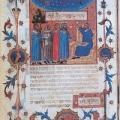162 - Sarah Stroumsa on Maimonides
Sarah Stroumsa tells Peter about Maimonides' cultural surroundings and attitudes towards philosophy and the Islamic tradition.
Themes:
• S. Stroumsa, "Al-Farabi and Maimonides on Medicine as Science," Arabic Sciences and Philosophy 3 (1993), 235-49.
• S. Stroumsa, "On Jewish Intellectuals who converted to Islam in the Early Middle Ages," in D. Frank, ed., The Jews of Medieval Islam: Community, Society, Identity (Leiden: 1995), 179-97.
• S. Stroumsa, "'Ravings': Maimonides Concept of Pseudo-Science," Aleph 1 (2001), 141-63.
• S. Stroumsa, "Maimonides and Mediterranean Culture," in C. Cluse (ed.), The Jews of Europe in the Middle Ages (Turnhout: 2004), 95-104.
• S. Stroumsa, "The Politico-Religious Context of Maimonides," in G. Tamer (ed.), The Trias of Maimonides. Jewish, Arabic, and ancient culture of knowledge (Berlin: 2005), 257-65.
• S. Stroumsa, "The Literary Corpus of Maimonides and Averroes," Maimonidean Studies 5 (2008), 193-210.
• S. Stroumsa, Maimonides in his World: Portrait of a Mediterranean Thinker (Princeton: 2012).
Prof Stroumsa's website at the Hebrew University of Jerusalem

Andalusia


 ..
..



Comments
Maimonides vs Avicenna
My impression from you et al is that Avicenna is The Big Deal in the medieval Islamic tradition. "Generally regarded as superior" by subsequent Muslim and Western philosophers to his predecessors, contemporaries, and successors for quite awhile, the value proposition seems to be that Avicenna
* built on al-Farabi (as he acknowledged)
* withstood the attacks from Averroes
* was more innovative and influential than either
But the impression I get from you and Stroumsa is that Maimonides deprecated Avicenna explicitly in favor of al-Farabi (who Maimonides regarded as "the bigger deal") and implicitly in favor of Averroes (who Maimonides seems to have drawn upon, if not explicitly acknowledged).
Sooo ... am I missing something? If (mostly) not, then: what was Maimonides' beef with Avicenna?
In reply to Maimonides vs Avicenna by Tom Roche
Maimonides on Avicenna
Yes, I think your impression is correct. As I mentioned in passing on the podcast, I think, Avicenna seems in general to have been far less influential in Andalusia than in the East where he totally dominates the scene. So Maimonides' failure to use him more extensively (though he does to some extent) is not unique to him, in fact it's just standard in the Andalusian tradition. It seems that Avicenna's works were rather incompletely known in Spain, as I mentioned in the Ibn Tufayl episode, so to some extent we'Re just talking about a failure of his texts to travel (remember Farabi is earlier so his books may have gotten there in time to exert influence - it seems that already Ibn Hazm knew ideas from the Baghdad school). By the way in a book I edited called Interpreting Avicenna there is a chapter about Avicenna's influence on medieval Jewish philosophy.
I was very surprised to hear
I was very surprised to hear that Maimonides was the first Jewish thinker to insist that God has no body. I took it for granted that that was the Jewish belief (and the whole point of the prohibition against images), at least by the time of Christ. And from reading early Christian writers you get the impression that they are confident God is immaterial and that this is not a point of contention between Christians and Jews - indeed, that Jews might have used God's immateriality to argue against the Incarnation. I'm very confused now...
In reply to I was very surprised to hear by Thomas Mirus
God's incorporeality
Does she say that in this interview? I don't think that can be right, for one thing Isaac Israeli, Saadia Gaon, and Ibn Gabirol would certainly have denied God's corporeality. But there is a lot of stuff in late antique Judaism about God's body (I discuss this in the Kabbalah episode), so it is equally far from obvious within Judaism to make God incorporeal. Perhaps what Sarah meant is that he is the first to say that Jews MUST believe that God has no body (in other words, this is not just a true doctrine but one that cannot be denied without going outside of the scope of acceptible Jewish belief). He was heavily criticized for that as I cover in subsequent episodes.
In reply to God's incorporeality by Peter Adamson
Sorry, yeah, I meant the
Sorry, yeah, I meant the first to insist on it as a matter of orthodoxy.
Add new comment